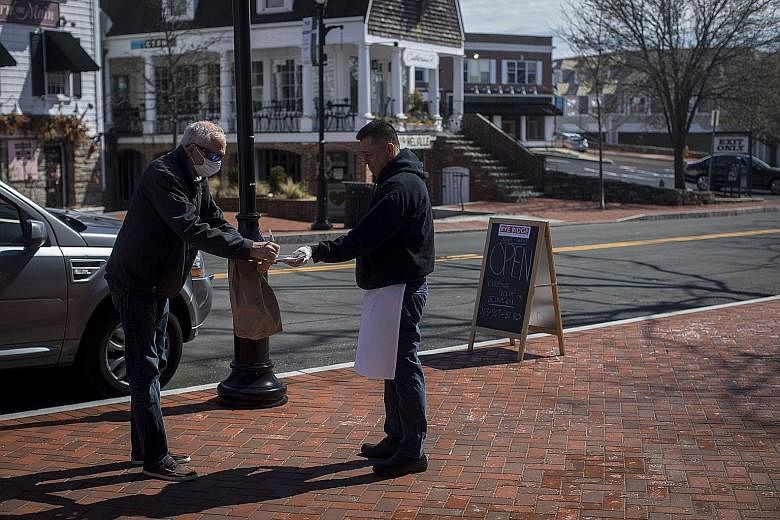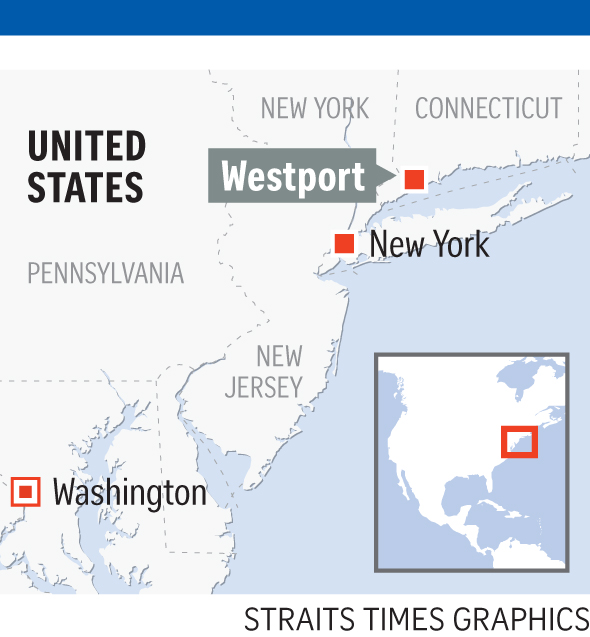WESTPORT (Connecticut) • About 50 guests gathered on March 5 at a home in the stately suburb of Westport in the US state of Connecticut, to toast the hostess on her 40th birthday and greet old friends, including one visiting from South Africa.
They shared reminiscences, a lavish buffet and, unknown to anyone, the coronavirus.
Then they scattered.
The Westport soiree - Party Zero in south-western Connecticut and beyond - is a story of how, in the Gilded Age of money, social connectedness and air travel, a pandemic has spread at lightning speed.
The partygoers - more than half of whom are now infected - left that evening for Johannesburg, New York City and other parts of Connecticut and the United States, all seeding infections on the way.
Westport, a town of 28,000 in Fairfield County, did not have a single known case of the coronavirus on the day of the party.
It had 85 by Monday, up more than 40 times in 11 days.
On Monday afternoon, Connecticut Governor Ned Lamont said at least 415 people in the state were infected, up from 327 on Sunday night. Ten people have died.
Westport, with less than 1 per cent of the state's population, now makes up more than one-fifth of its Covid-19 infections with its 85 cases.
"We tend to double the people who are infected every three or four days," Mr Lamont said.
He pleaded with federal officials for hospital capacity and protective gear. "I urge them: Don't think in terms of New York, think in terms of the hot spots," he said.
"And that's New York City, Westchester County - and Fairfield County."
Science cannot definitively link those escalating numbers to New York, which now accounts for about half of the coronavirus infections in the US.
But the Westport soiree "may be an example of the kind of thing we call a super-spreading event", said Dr William Hanage, an associate professor of epidemiology at Harvard, especially since some of the partygoers later attended large social events in the New York metropolitan area.
"Some of the early cases in northern Italy were associated with small towns, and people thought, 'Oh, it's just in the small towns.' But then, you suddenly find cases emerging from Milan Fashion Week and spreading internationally," Dr Hanage said.
The visitor from Johannesburg - a 43-year-old businessman, according to a report from South Africa - fell ill on his flight home, spreading the virus not only in the country but also possibly to fellow passengers.
The party guests attended other gatherings. They went to work at jobs throughout the New York metropolitan area. Their children went to school and daycare, football games and after-school sports.
On the morning of March 8, three days after the party, Ms Julie Endich, one of the guests, woke up in Westport with a fever that spiked to 40 deg C and "pain, tightness and heaviness like someone was standing on my chest", she later wrote on Facebook.
She knew her symptoms suggested Covid-19, the disease caused by the coronavirus, but it would be four days before she could get test results confirming that she had it.
At noon that day, town and county health officials convened a coronavirus forum at the Westport Library. About 60 people attended, and many others watched on Facebook.
When asked whether people, especially Westport's many older residents, should follow federal government guidance and avoid large gatherings, officials were sanguine.
"It is not out in our community that we're aware of yet," said Mr Mark Cooper, director of the Westport Weston Health District.
"Give it some thought, but, again, your risk is low."
Three days later, on March 11, Mr Cooper got a phone call: A South African businessman who had stopped in Westport for a party had fallen ill on the plane home to Johannesburg.
"I thought it was good old man flu," the businessman told The Sunday Times in South Africa, speaking anonymously in a March 15 article. Unlike in the United States, where tests remain in short supply and results come slowly, the man was tested and received word in a day. He was positive.
Mr Cooper and his staff of nine dusted off their pandemic response plan and began calling party guests, identified by the Westport hosts.
A number of the guests had children. Several hours later, Westport closed its schools and most public buildings.
Mr Jim Marpe, the Westport first selectman - the equivalent of a mayor - convened a hasty news conference on the steps of the Westport Town Hall.
"We'll assess the health of those individuals and try to give them some helpful advice in terms of protecting themselves and their family and helping prevent further spread," Mr Cooper told the crowd.
But, he warned, "the reality is, once it starts to spread in a community, it's beyond trying to stop it".
The health district worked with a private company to conduct drive-through testing for party guests only on March 12. About 38 guests showed up, and more than half their tests came back positive. Ms Endich, after days of rejected attempts, was tested and received her positive result on March 12.
"What we were trying to do was put our arms around it quickly and snuff it out," Mr Cooper said.
"Never did we dream that in a week's time, we were going to be in the middle of an epidemic."
The number of sick people in Fairfield County then soared.
On March 16, Mr Lamont closed restaurants and public buildings statewide. Even in a well-connected, affluent town like Westport, contact tracing quickly overwhelmed health officials.
One of the party guests later acknowledged attending an event with 420 other people, he said. The officials gave up.
The party hosts remain unknown to most, though speculation is rife.
Two of the guests, Ms Endich and Ms Cheryl Chutter, an attendee who lives in Stamford, have identified themselves. Though she said she was "relentless" in demanding a test, Ms Chutter was not diagnosed until March 17.
Meanwhile, the first partygoer to be diagnosed has fully recovered and even planned to go for a jog.
"I don't believe I'm the problem any more," he told The Sunday Times in South Africa.
"It seems that the real problem is now the people who are too scared to say anything. The problem is the ignorance of the public."
NYTIMES


